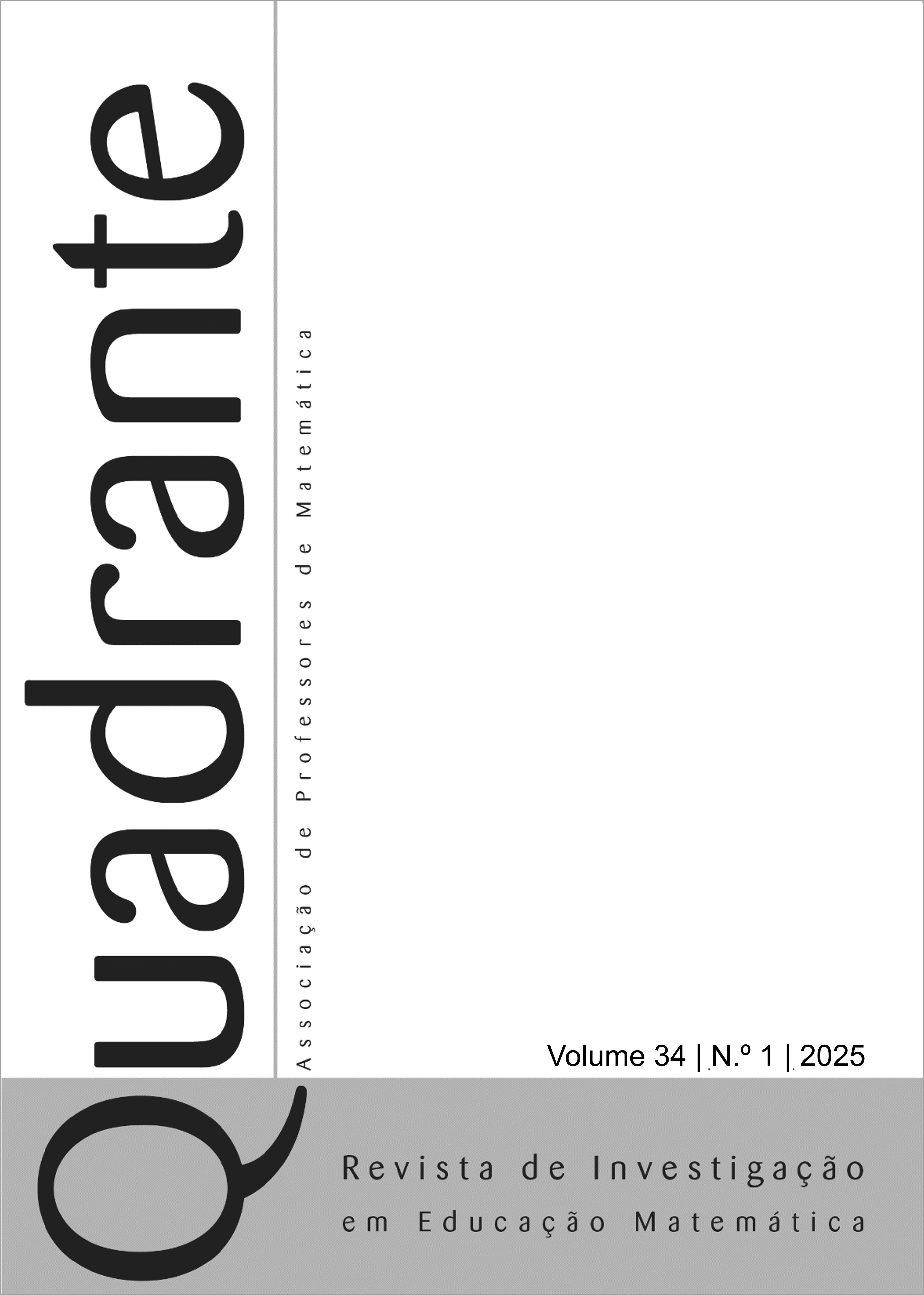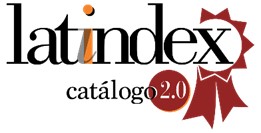Mathematics education and affectivity: an exploratory study about the teaching and learning processes in Higher Education
DOI:
https://doi.org/10.48489/quadrante.32698Keywords:
educação matemática no ensino superior, matemática emocional, afetividade matemática, dimensão afetivaAbstract
The path taken during Higher Education (HE) can bring both positive and negative consequences for the students. Those who are unable to meet the challenges imposed by the Higher Education Institution, almost always due to their academic performance, become vulnerable to failures (poor academic performance, difficulty in managing family relationships, etc.), which can lead to drop out. Considering that affectivity is present in all social interactions, it is also involved in the relationships experienced during HE. This article aims to discuss the affective dimension and its impact on the learning of mathematics subjects in courses of the Exact Sciences and Technology Sectors of a Public Higher Education Institution in the southern region of Brazil. The study was carried out through the application of an online questionnaire composed of open and closed questions, elaborated in the Google Forms platform. From the analysis of the students’ answers and based on theoretical frames on Mathematics Affectivity, we reflected on its impact on the academic performance and learning of these students. We highlight that greater attention to the impact of affective relationships is extremely important, as well as the need for constant revisiting the teaching practices, aiming to create an environment conducive to learning within HE.
References
Alcântara, L. (2022). O insucesso em matemática na educação técnica: um estudo com enfoque na dimensão afetiva da aprendizagem. (Tese de Doutoramento). Instituto de Educação, Universidade de Lisboa. http://hdl.handle.net/10451/54664
ANDIFES. (2018). Perfil Socioeconômico e Cultural dos Estudantes de Graduação das Universidades Federais Brasileiras. Fórum Nacional de Pró-Reitores de Assuntos Comunitários e Estudantes (FONAPRACE). Brasília.
Auzmendi, E. (1992). Las actitudes hacia la matemática/estadística en las enseñanzas medias y universitarias. Características y medición. Mensajero.
Cunha, M. I. (2006). Docência na universidade, cultura e avaliação institucional: saberes silenciados em questão. Revista Brasileira de Educação, 11(32), 258–371. https://doi.org/10.1590/S1413-24782006000200005
Di Martino, P., Gregorio, F., & Iannone, P. (2023). The transition from school to university in mathematics education research: new trends and ideas from a systematic literature review. Educational Studies in Mathematics 113, 7–34. https://doi.org/10.1007/s10649-022-10194-w
Flick, U. (2009). Introdução à pesquisa qualitativa. (Trad. Joice Elias Costa, 3.ª ed.). Artmed.
Freire. P. (2003). Pedagogia da autonomia: saberes necessários à prática educativa. Paz e Terra.
Gerab, F., & Godoy, E. V. (2018a). Transição ensino médio-ensino de engenharia na perspectiva do professor de matemática. Alexandria: Revista de Educação em Ciência e Tecnologia, 11(2), 361–385, https://doi.org/10.5007/1982-5153.2018v11n2p361
Gerab, F., & Godoy, E. V. (2018b). A Transição Ensino Médio - Ensino de Engenharia na Perspectiva do Aprendizado de Matemática: Um Diagnóstico sob a Ótica do Estudante. In F. Gerab, & E. V. Godoy. (Orgs.), Ensino e Aprendizagem de Matemática na Educação Superior: Inovações, propostas e desafios (pp. 3–28). Altabooks.
Gerab, I. F. F., Batista, S. H., Sonzogno, M. C., Yamashiro, C. G., Gerab, F., & Moreno, L. R. (2014). Avaliação da disciplina de formação didático-pedagógica em saúde: a ótica dos pós-graduandos. Revista Brasileira de Pós-Graduação (RBPG), 11(24), 533–552. https://doi.org/10.21713/2358-2332.2014.v11.506
Gómez-Chacón, G. M. I. (2003). Matemática Emocional: Os afetos na aprendizagem matemática. (Trad. Daisy Vaz de Morais). Artmed.
Guimarães, D. C. F. (2008). A afetividade na sala de aula: as atividades de ensino e suas implicações na relação sujeito-objeto. (Dissertação de Mestrado em Educação). Universidade Estadual de Campinas, Brasil.
Leite, S. A. S. (2006). Dimensões afetivas na relação professor-aluno. In E. C. M. Tassoni (Ed.), A afetividade em sala de aula: as condições de ensino e a mediação do professor (pp. 18–34). Casa do Psicólogo.
Leite, S. A. S. (2012). Afetividade nas práticas pedagógicas. Temas em Psicologia, 20(2), 355–368. https://doi.org/10.9788/TP2012.2-06
Loesch, C., & Hoeltgebaum, M. (2012). Métodos estatísticos multivariados. Saraiva.
Loos-Sant’ana, H., & Britto. F. R. M. (2017). Atitude e desempenho em matemática, crenças autorreferenciadas e família: uma path-analysis. Bolema, 31(58), 590–613. https://doi.org/10.1590/1980-4415v31n58a03
Mahoney, A. A., & Almeida, L. R. de. (2005). Afetividade e processo ensino-aprendizagem: contribuições de Henri Wallon. Psicologia da Educação, 20, 11–30. https://pepsic.bvsalud.org/scielo.php?script=sci_abstract&pid=s1414-69752005000100002
Maingueneau, D. (2015). Discurso e análise do discurso. (Trad. Sírio Possenti, 1.ª ed.). Parábola Editorial.
Masetto, M. T. (2003). Competências pedagógicas do professor universitário. Summus.
Mcleod, D. B. (1992). Research on affect in mathematics education: A reconceptualization. In D. A. Grows (Ed.), Handbook of Research on Mathematics Teaching and Learning. (pp. 575–596). Macmillan.
Mcleod, D. B. (1994). Research on affect and mathematics learning in the JRME: 1970 to the present. Journal for Research in Mathematics Education, 25(6), 637–647. https://doi.org/10.2307/749576
Orlandi, E. P. (2020). Análise de Discurso: Princípios e Procedimentos. (13ª ed.). Pontes Editores.
Pekrun, R., Frenzel, A. C., & Goetz, T. (2007). The control-value theory of achievement emotions: an integrative approach to emotions in education. In A. P. Schutz, & R.. Pekrun (Eds.), Emotion in Education (pp. 13–36). Academic Press.
Pimenta, S. G., & Anastasiou, L. G. C. (2002). Docência no Ensino Superior. Cortez.
Tassoni, E. C. M., & Leite, S. A. D. S. (2013). Afetividade no processo de ensino-aprendizagem: as contribuições da teoria walloniana. Educação, 36(2), 262–271. https://revistaseletronicas.pucrs.br/faced/article/view/9584
Varella, C. A. A. (2008). Análise multivariada aplicada às ciências agrárias: análise de componentes principais. http://www.ufrrj.br/institutos/it/deng/varella/analise%20multivariada.htm
Vygotsky, L. S. (2004). Psicologia Pedagógica. Martins Fontes.
Zan, R., & Di Martino, P. (2007). Attitude toward mathematics: Overcoming the positive/negative dichotomy. The Montana Mathematics Enthusiast (Monograph 3), 157–168.











